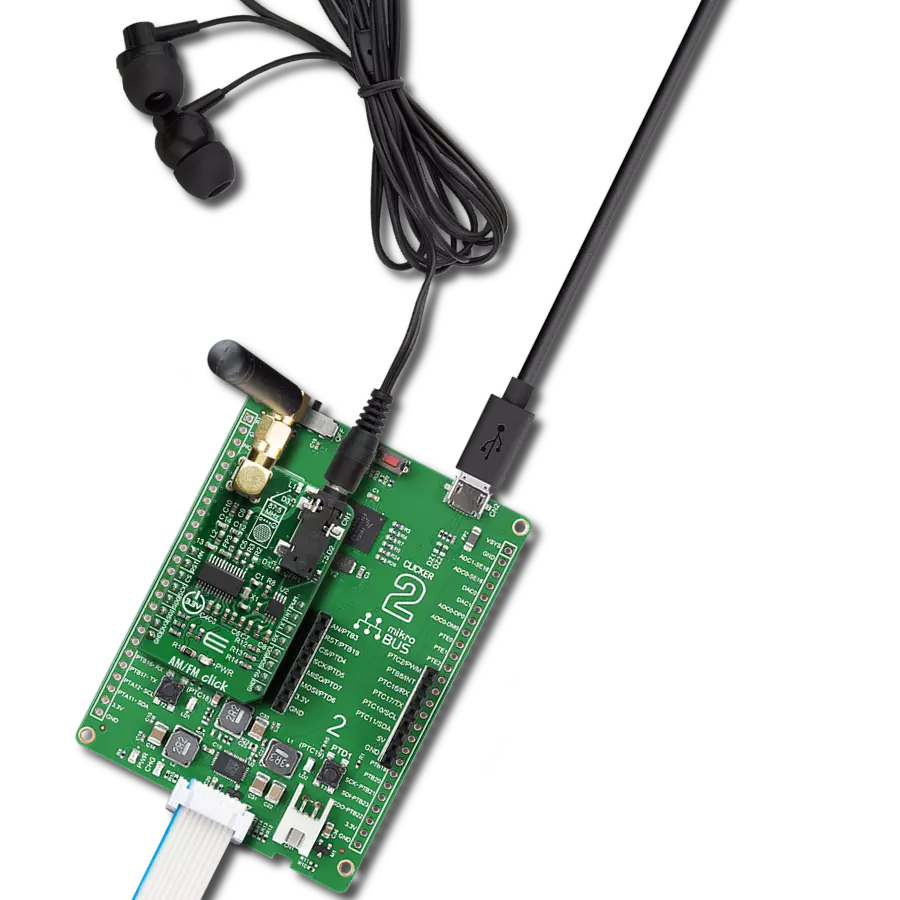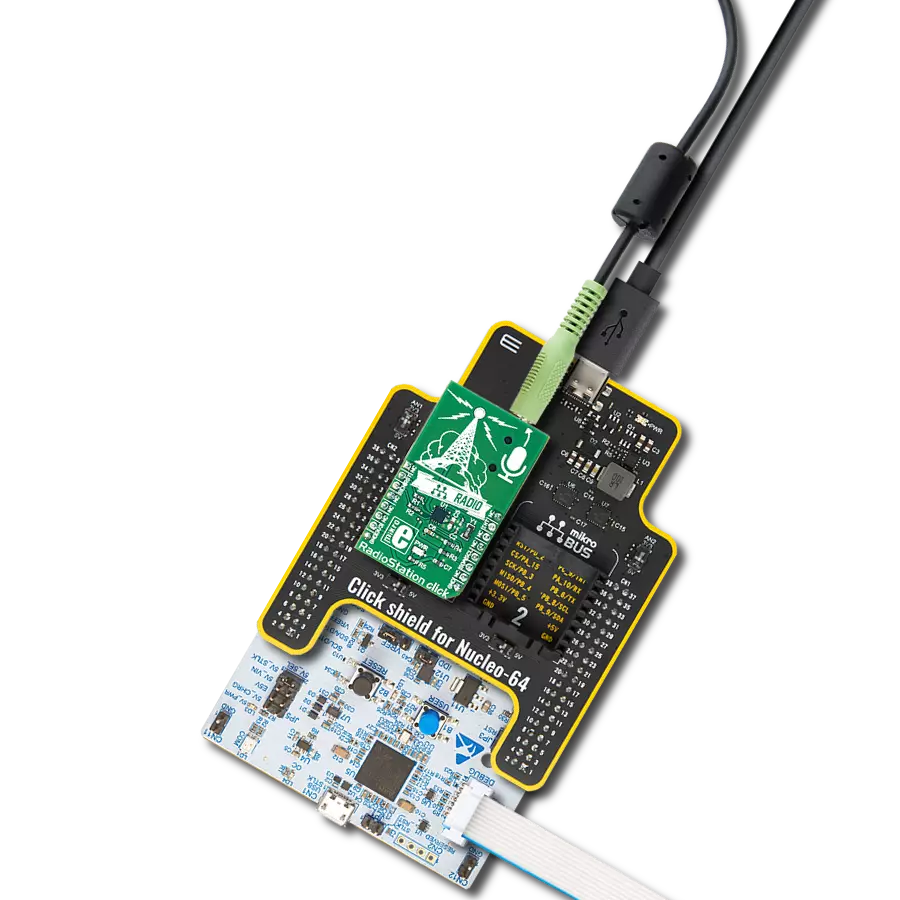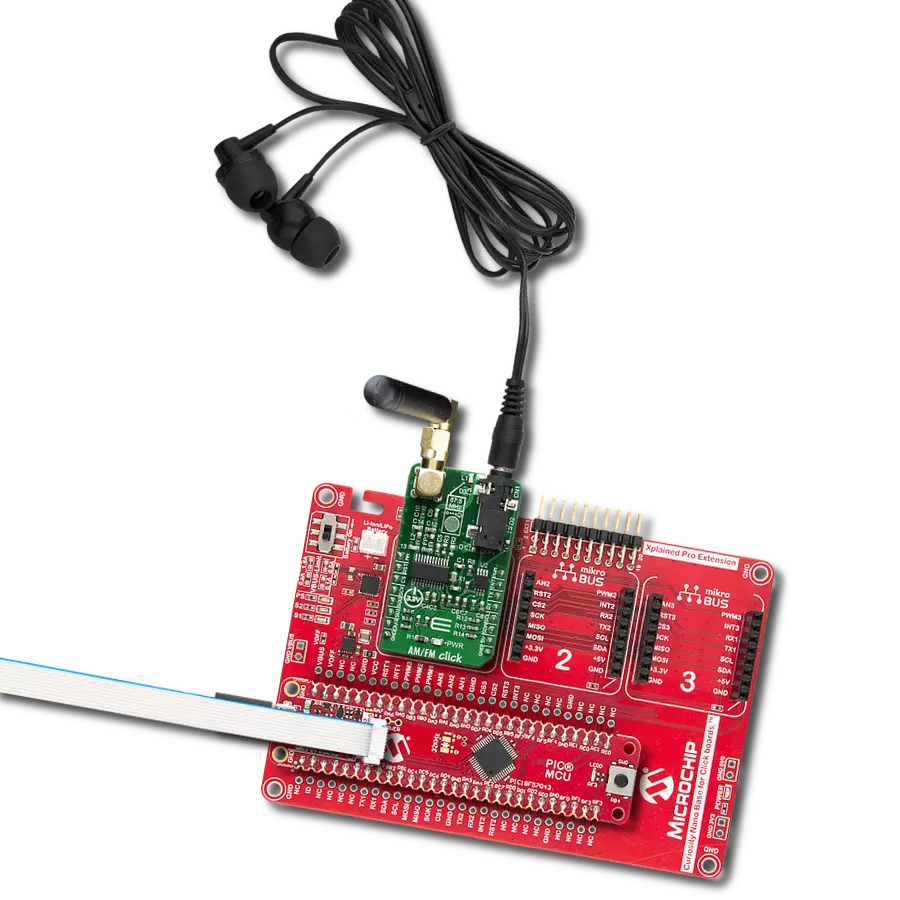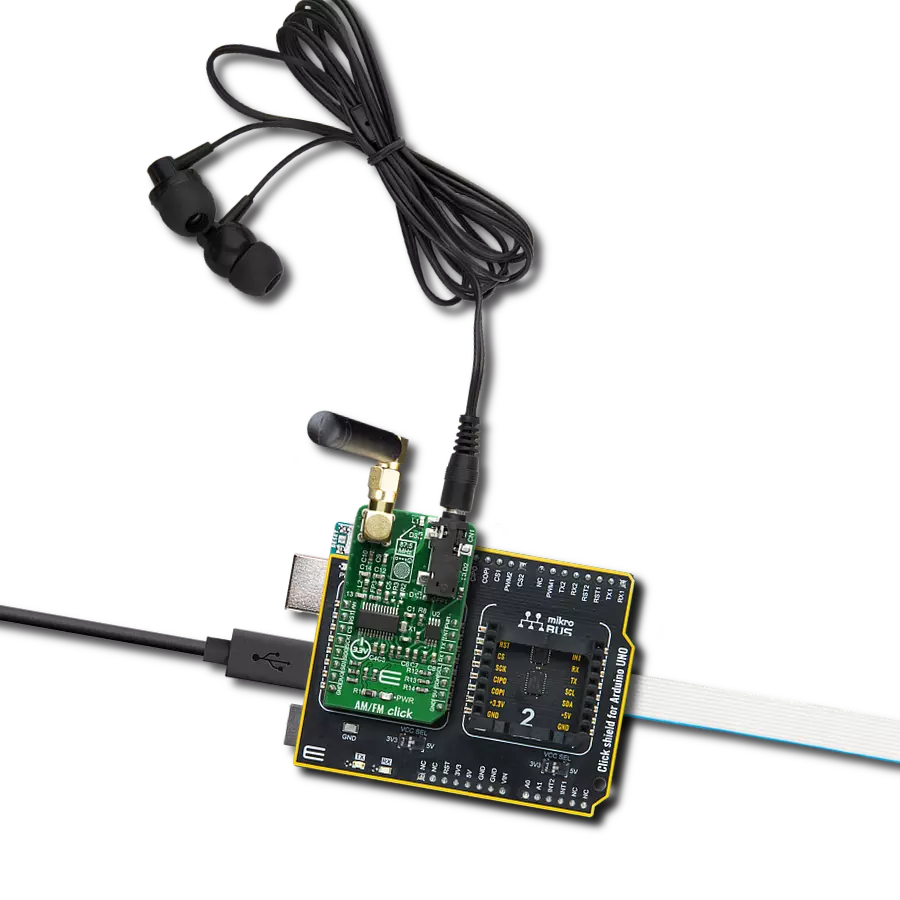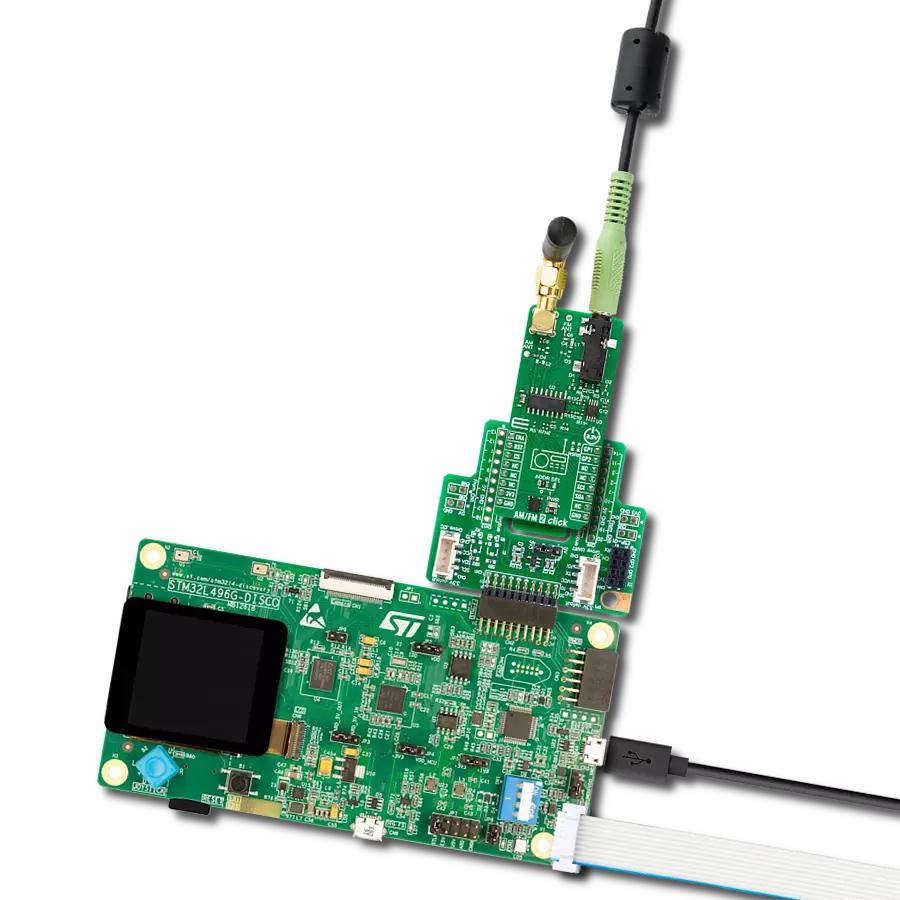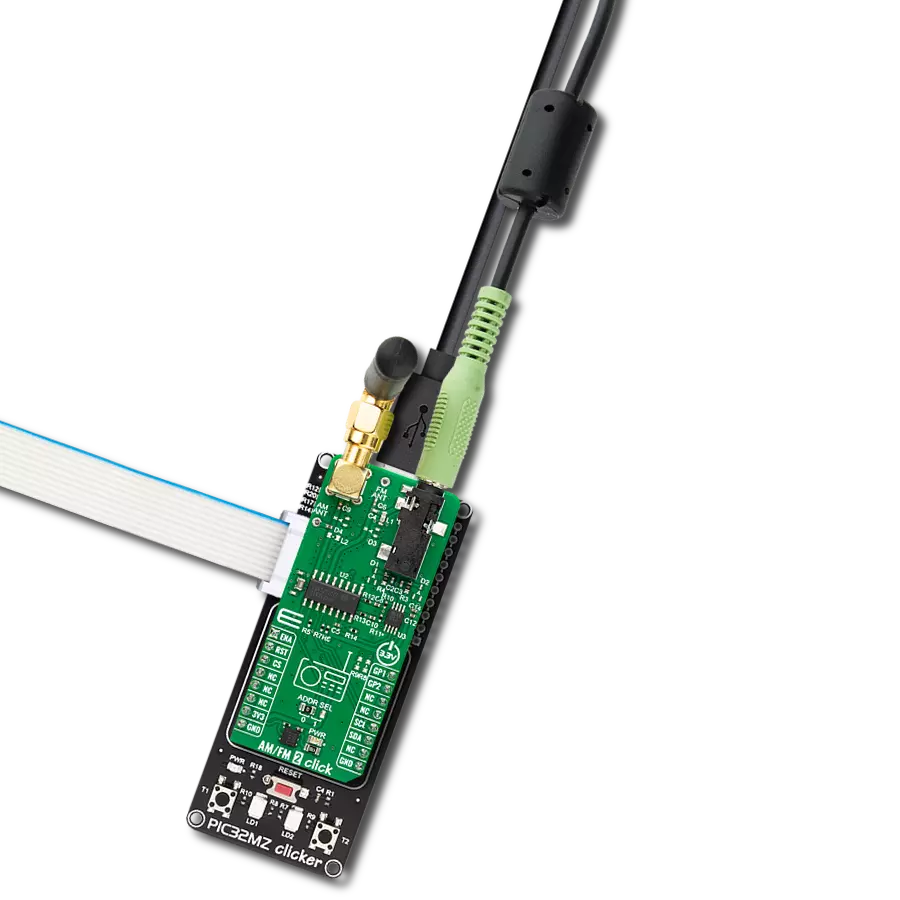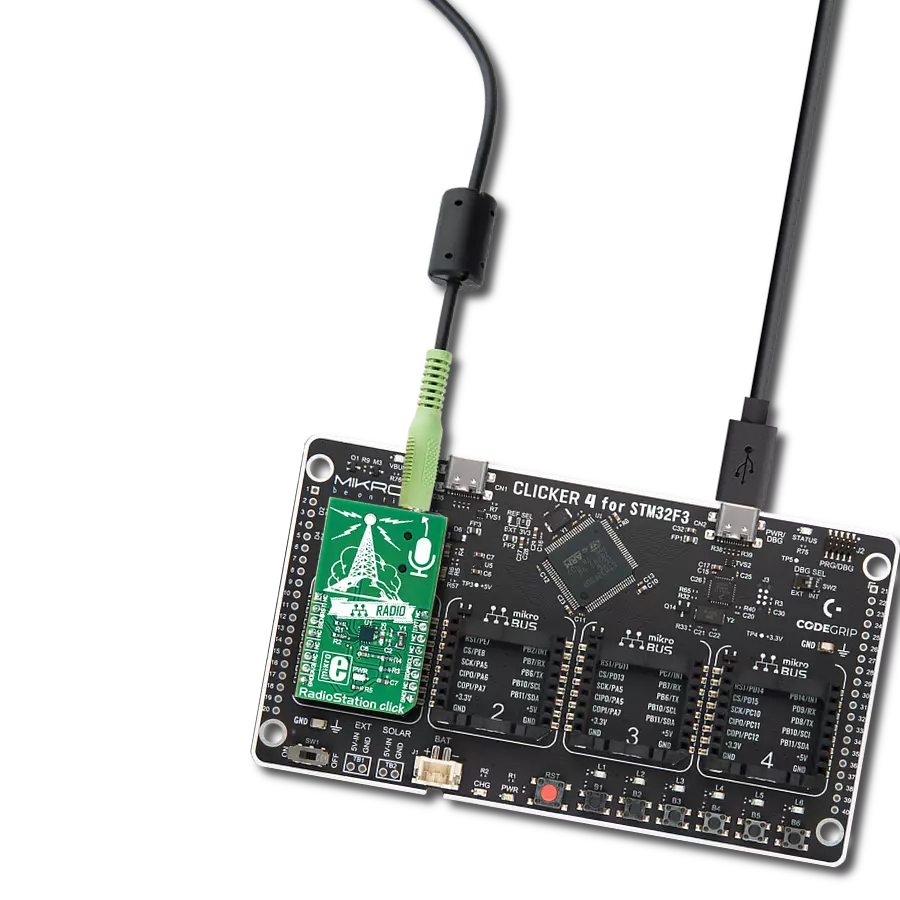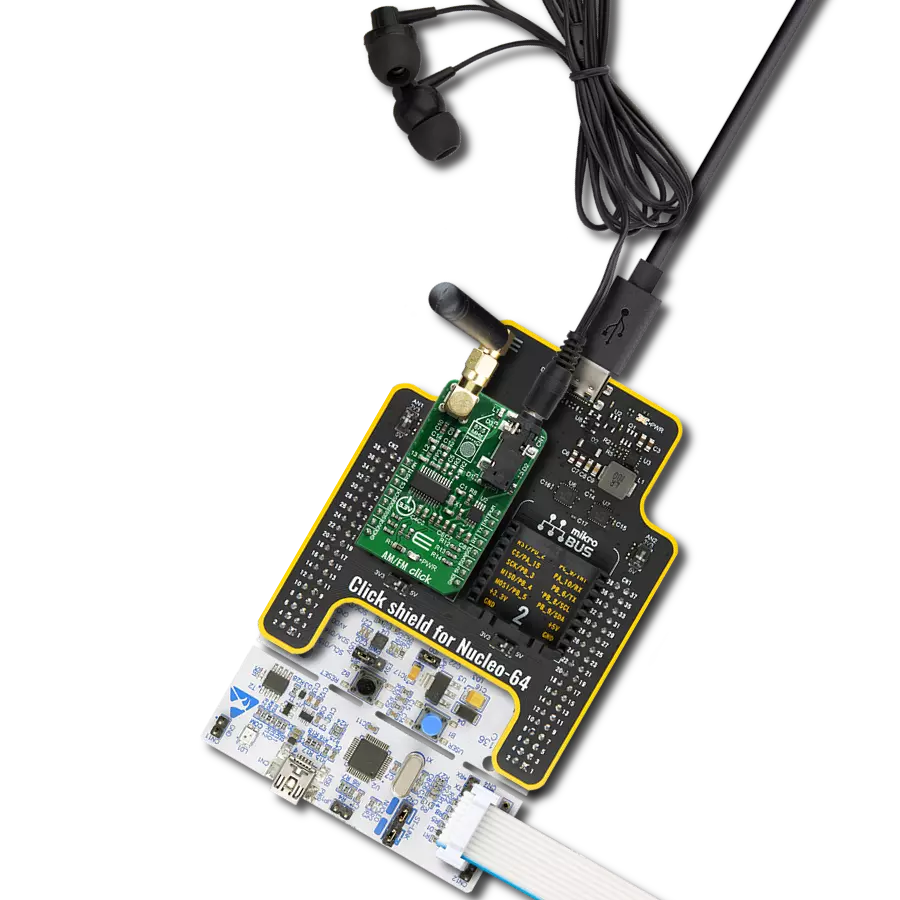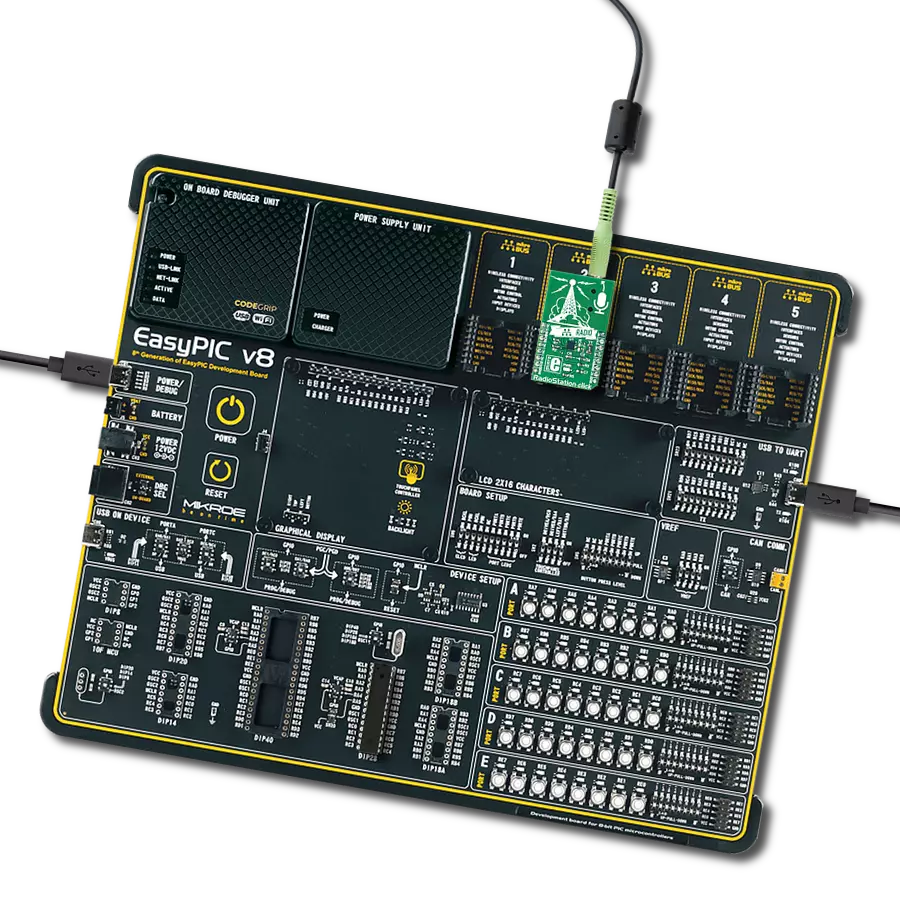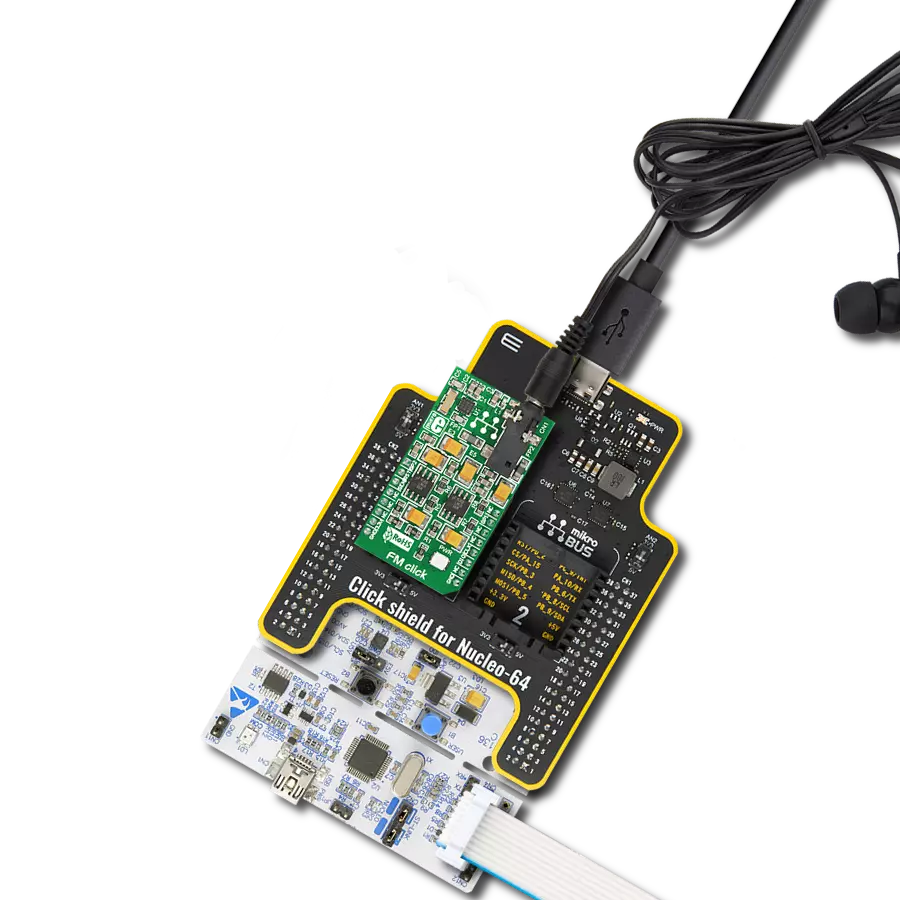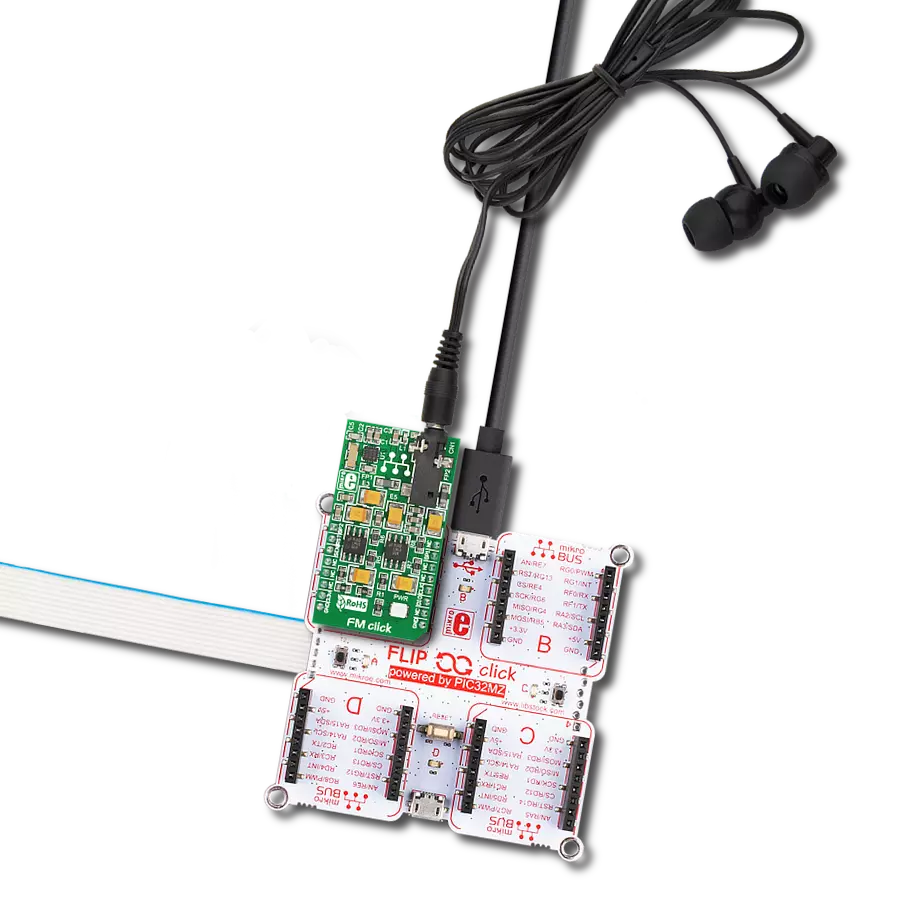沉浸在声音的交响乐中,我们的收音机接收器打开了电波,将丰富的AM和FM音乐直接带到您的耳中。
A
A
硬件概览
它是如何工作的?
AM/FM Click基于Si4731,这是一款来自Silicon Labs的数字CMOS AM/FM收音机接收IC,它集成了从天线输入到数字音频输出的完整广播调谐器和接收功能。Si4731的音频信号通过Texas Instruments的LM4910 - 一个输出无电容立体声35mW耳机放大器,传送到板上的迷你3.5毫米母插孔。这样,用户可以直接将耳机插入Click板™,无需任何外部放大器。Si4731 IC利用Silicon Labs经验证的数字低中频(IF)架构,为消费电子应用提供具有高TDMA噪声免疫性、优越的广播性能和高保真音频功率放大功能的经济
高效的数字音频平台。音频信号经过处理以具有最佳动态特性。集成的DSP还处理信号的立体声MPX编码和FM调制。低级数字中频(IF)信号被滤除并发送到输出,通过高分辨率模数转换器(ADC)放大、滤波和数字化。这种先进的架构使Si4731能够进行信道选择、FM解调和立体声音频处理,达到比传统模拟架构更优越的性能。该Click设计用于通过I2C/双线控制接口进行通信。在选择双线模式时,SCLK引脚在RST引脚上升沿期间应保持在高电平,并保持高电平直到第一个启动条件之后。此外,在RST引脚上
升沿前的300nS内不得发生启动条件。双线总线模式仅使用SCL和SDA引脚进行通信。Si4731 IC具有接收信号测量能力。用于广播信号的天线也可以用于接受接收设备发送的信号。虽然它可以同时用于接收和发送信号,但天线不能同时在两种模式下工作。这一特性在校准Click板的发射功率时非常有用。此Click板™只能在3.3V逻辑电压级别下操作。在使用具有不同逻辑级别的MCU之前,必须进行适当的逻辑电压级别转换。此外,它配备了一个包含函数和示例代码的库,可以作为进一步开发的参考。
功能概述
开发板
Clicker 2 for Kinetis 是一款紧凑型入门开发板,它将 Click 板™的灵活性带给您喜爱的微控制器,使其成为实现您想法的完美入门套件。它配备了一款板载 32 位 ARM Cortex-M4F 微控制器,NXP 半导体公司的 MK64FN1M0VDC12,两个 mikroBUS™ 插槽用于 Click 板™连接,一个 USB 连接器,LED 指示灯,按钮,一个 JTAG 程序员连接器以及两个 26 针头用于与外部电子设备的接口。其紧凑的设计和清晰、易识别的丝网标记让您能够迅速构建具有独特功能和特性
的小工具。Clicker 2 for Kinetis 开发套件的每个部分 都包含了使同一板块运行最高效的必要组件。除了可以选择 Clicker 2 for Kinetis 的编程方式,使用 USB HID mikroBootloader 或外部 mikroProg 连接器进行 Kinetis 编程外,Clicker 2 板还包括一个干净且调节过的开发套件电源供应模块。它提供了两种供电方式;通过 USB Micro-B 电缆,其中板载电压调节器为板上每个组件提供适当的电压水平,或使用锂聚合物 电池通过板载电池连接器供电。所有 mikroBUS™ 本
身支持的通信方法都在这块板上,包括已经建立良好的 mikroBUS™ 插槽、重置按钮和几个用户可配置的按钮及 LED 指示灯。Clicker 2 for Kinetis 是 Mikroe 生态系统的一个组成部分,允许您在几分钟内创建新的应用程序。它由 Mikroe 软件工具原生支持,得益于大量不同的 Click 板™(超过一千块板),其数量每天都在增长,它涵盖了原型制作的许多方面。
微控制器概述
MCU卡片 / MCU
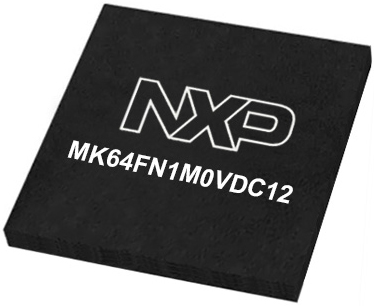
建筑
ARM Cortex-M4
MCU 内存 (KB)
1024
硅供应商
NXP
引脚数
121
RAM (字节)
262144
你完善了我!
配件
使用的MCU引脚
mikroBUS™映射器
“仔细看看!”
Click board™ 原理图

一步一步来
项目组装
软件支持
库描述
此库包含AM/FM Click驱动程序的API。
关键功能:
amfm_tune_up- 此功能将当前频率增加10 KHzamfm_set_volume- 此功能设置音量级别,范围为0到63amfm_get_stc- 此功能检查STC位状态
开源
代码示例
完整的应用程序代码和一个现成的项目可以通过NECTO Studio包管理器直接安装到NECTO Studio。 应用程序代码也可以在MIKROE的GitHub账户中找到。
/*!
* \file
* \brief AmFm Click example
*
* # Description
* This app simulate RADIO RECEIVER.
*
* The demo application is composed of two sections :
*
* ## Application Init
* Initializes device.
*
* ## Application Task
* Several additional functions are executed and printed over the terminal.
*
* \author MikroE Team
*
*/
// ------------------------------------------------------------------- INCLUDES
#include "board.h"
#include "log.h"
#include "amfm.h"
// ------------------------------------------------------------------ VARIABLES
static amfm_t amfm;
static log_t logger;
float aux;
uint8_t volume = 0x3F;
uint8_t mute_flag = 0;
uint8_t status;
uint16_t station_1 = 0;
uint16_t station_2 = 0;
uint16_t station_3 = 0;
uint16_t station_4 = 0;
uint16_t station_5 = 0;
uint16_t station_frequency = 0;
uint8_t memory = 0;
// ------------------------------------------------------- ADDITIONAL FUNCTIONS
void amfm_case_memorize ( )
{
switch ( memory )
{
case 0 :
{
station_1 = station_frequency;
memory += 1;
log_printf( &logger, "> > > station 1 memorized\r\n" );
break;
}
case 1 :
{
station_2 = station_frequency;
memory += 1;
log_printf( &logger, "> > > station 2 memorized\r\n" );
break;
}
case 2 :
{
station_3 = station_frequency;
memory += 1;
log_printf( &logger, "> > > station 3 memorized\r\n" );
break;
}
case 3 :
{
station_4 = station_frequency;
memory += 1;
log_printf( &logger, "> > > station 4 memorized\r\n" );
break;
}
case 4 :
{
station_5 = station_frequency;
memory = 0;
log_printf( &logger, "> > > station 5 memorized\r\n" );
break;
}
default :
{
break;
}
}
log_printf( &logger, "-----------------------------------------\r\n" );
}
void amfm_case_station_1 ( amfm_t *ctx )
{
log_printf( &logger, "> > > tune station 1 \r\n" );
amfm_tune_frequency( ctx, station_1 );
log_printf( &logger, "> > > tune done \r\n" );
aux = station_1 / 100.0;
log_printf( &logger, "> > > frequency: %f MHz \r\n", aux );
log_printf( &logger, "-----------------------------------------\r\n" );
}
void amfm_case_station_2 ( amfm_t *ctx )
{
log_printf( &logger, "> > > tune station 2 \r\n" );
amfm_tune_frequency( ctx, station_2 );
log_printf( &logger, "> > > tune done \r\n" );
aux = station_2 / 100.0;
log_printf( &logger, "> > > frequency: %f MHz \r\n", aux );
log_printf( &logger, "-----------------------------------------\r\n" );
}
void amfm_case_station_3 ( amfm_t *ctx )
{
log_printf( &logger, "> > > tune station 3 \r\n" );
amfm_tune_frequency( ctx, station_3 );
log_printf( &logger, "> > > tune done \r\n" );
aux = station_3 / 100.0;
log_printf( &logger, "> > > frequency: %f MHz \r\n", aux );
log_printf( &logger, "-----------------------------------------\r\n" );
}
void amfm_case_station_4 ( amfm_t *ctx )
{
log_printf( &logger, "> > > tune station 4 \r\n" );
amfm_tune_frequency( ctx, station_4 );
log_printf( &logger, "> > > tune done \r\n" );
aux = station_4 / 100.0;
log_printf( &logger, "> > > frequency: %f MHz \r\n", aux );
log_printf( &logger, "-----------------------------------------\r\n" );
}
void amfm_case_station_5 ( amfm_t *ctx )
{
log_printf( &logger, "> > > tune station 5 \r\n" );
amfm_tune_frequency( ctx, station_5 );
log_printf( &logger, "> > > tune done \r\n" );
aux = station_5 / 100.0;
log_printf( &logger, "> > > frequency: %f MHz \r\n", aux );
log_printf( &logger, "-----------------------------------------\r\n" );
}
void amfm_case_seek ( amfm_t *ctx )
{
log_printf( &logger, "> > > seek \r\n" );
amfm_seek( ctx );
log_printf( &logger, "> > > seek done \r\n" );
station_frequency = amfm_get_channel( ctx );
aux = station_frequency / 100.0;
log_printf( &logger, "> > > frequency: %f MHz \r\n", aux );
log_printf( &logger, "-----------------------------------------\r\n" );
}
void amfm_case_plus ( amfm_t *ctx )
{
if ( volume < 63 )
{
volume += 1;
amfm_set_volume( ctx, volume );
log_printf( &logger, "> > > volume: %u \r\n", volume );
}
else
{
log_printf( &logger, "> > > volume: MAX \r\n" );
}
log_printf( &logger, "-----------------------------------------\r\n" );
}
void amfm_case_minus ( amfm_t *ctx )
{
if ( volume > 0 )
{
volume -= 1;
amfm_set_volume( ctx, volume );
log_printf( &logger, "> > > volume: %u \r\n", volume );
}
else
{
log_printf( &logger, "> > > volume: MIN \r\n" );
}
log_printf( &logger, "-----------------------------------------\r\n" );
}
void amfm_case_mute ( amfm_t *ctx )
{
if ( 0 == mute_flag )
{
amfm_mute( ctx );
log_printf( &logger, "> > > mute ON \r\n" );
mute_flag = 1;
}
else
{
amfm_unmute( ctx );
log_printf( &logger, "> > > mute OFF \r\n" );
mute_flag = 0;
}
log_printf( &logger, "-----------------------------------------\r\n" );
}
void amfm_case_tune_up ( amfm_t *ctx )
{
amfm_tune_up( ctx );
station_frequency = amfm_get_channel( ctx );
aux = station_frequency / 100.0;
log_printf( &logger, "> > > frequency: %f MHz \r\n", aux );
log_printf( &logger, "-----------------------------------------\r\n" );
}
void amfm_case_tune_down ( amfm_t *ctx )
{
amfm_tune_down( ctx );
station_frequency = amfm_get_channel( ctx );
aux = station_frequency / 100.0;
log_printf( &logger, "> > > frequency: %f MHz \r\n", aux );
log_printf( &logger, "-----------------------------------------\r\n" );
}
// ------------------------------------------------------ APPLICATION FUNCTIONS
void application_init ( void )
{
log_cfg_t log_cfg;
amfm_cfg_t cfg;
/**
* Logger initialization.
* Default baud rate: 115200
* Default log level: LOG_LEVEL_DEBUG
* @note If USB_UART_RX and USB_UART_TX
* are defined as HAL_PIN_NC, you will
* need to define them manually for log to work.
* See @b LOG_MAP_USB_UART macro definition for detailed explanation.
*/
LOG_MAP_USB_UART( log_cfg );
log_init( &logger, &log_cfg );
log_info( &logger, "---- Application Init ----" );
// Click initialization.
amfm_cfg_setup( &cfg );
AMFM_MAP_MIKROBUS( cfg, MIKROBUS_1 );
amfm_init( &amfm, &cfg );
Delay_ms ( 100 );
status = amfm_init_device( &amfm );
if ( 0 == status )
{
log_printf( &logger, "> > > app init done < < <\r\n" );
}
else if ( 1 == status )
{
log_printf( &logger, "> > > timeout < < <\r\n" );
}
Delay_ms ( 1000 );
amfm_case_seek( &amfm );
amfm_case_memorize( );
Delay_ms ( 1000 );
amfm_case_seek( &amfm );
amfm_case_memorize( );
Delay_ms ( 1000 );
amfm_case_seek( &amfm );
amfm_case_memorize( );
Delay_ms ( 1000 );
amfm_case_seek( &amfm );
amfm_case_memorize( );
Delay_ms ( 1000 );
amfm_case_seek( &amfm );
amfm_case_memorize( );
Delay_ms ( 1000 );
amfm_case_plus( &amfm );
Delay_ms ( 1000 );
}
void application_task ( void )
{
amfm_case_station_1( &amfm );
// 10 seconds delay
Delay_ms ( 1000 );
Delay_ms ( 1000 );
Delay_ms ( 1000 );
Delay_ms ( 1000 );
Delay_ms ( 1000 );
Delay_ms ( 1000 );
Delay_ms ( 1000 );
Delay_ms ( 1000 );
Delay_ms ( 1000 );
Delay_ms ( 1000 );
amfm_case_station_2( &amfm );
// 10 seconds delay
Delay_ms ( 1000 );
Delay_ms ( 1000 );
Delay_ms ( 1000 );
Delay_ms ( 1000 );
Delay_ms ( 1000 );
Delay_ms ( 1000 );
Delay_ms ( 1000 );
Delay_ms ( 1000 );
Delay_ms ( 1000 );
Delay_ms ( 1000 );
amfm_case_station_3( &amfm );
// 10 seconds delay
Delay_ms ( 1000 );
Delay_ms ( 1000 );
Delay_ms ( 1000 );
Delay_ms ( 1000 );
Delay_ms ( 1000 );
Delay_ms ( 1000 );
Delay_ms ( 1000 );
Delay_ms ( 1000 );
Delay_ms ( 1000 );
Delay_ms ( 1000 );
amfm_case_station_4( &amfm );
// 10 seconds delay
Delay_ms ( 1000 );
Delay_ms ( 1000 );
Delay_ms ( 1000 );
Delay_ms ( 1000 );
Delay_ms ( 1000 );
Delay_ms ( 1000 );
Delay_ms ( 1000 );
Delay_ms ( 1000 );
Delay_ms ( 1000 );
Delay_ms ( 1000 );
amfm_case_station_5( &amfm );
// 10 seconds delay
Delay_ms ( 1000 );
Delay_ms ( 1000 );
Delay_ms ( 1000 );
Delay_ms ( 1000 );
Delay_ms ( 1000 );
Delay_ms ( 1000 );
Delay_ms ( 1000 );
Delay_ms ( 1000 );
Delay_ms ( 1000 );
Delay_ms ( 1000 );
}
int main ( void )
{
/* Do not remove this line or clock might not be set correctly. */
#ifdef PREINIT_SUPPORTED
preinit();
#endif
application_init( );
for ( ; ; )
{
application_task( );
}
return 0;
}
// ------------------------------------------------------------------------ END
